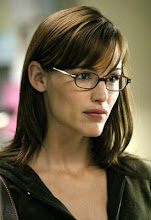And thusly begins our discussion about Lost.
When people say they gave up on Lost, I completely see why (in fact, the producers see why), but in the past few seasons the rewards for the faithful have been plentiful, and the non-stop "ohmygodwhatthefrak?" for this season has been stimulating and exciting. While the endgame is most certainly not clear, the progress being made in the bigger picture is definitely something to write home about.
When I'm done watching an episode and still processing, I make sure and read Doc Jensen, and watch his podcasts, because it's the man's job to have too much time on his hands when it comes to things like Lost. He talks about philosophers and quantum theories, and literary connections that might be stretching too far, but that are there nonetheless. Doc's analysis is so intense that you almost hope he's wrong about everything, because if it takes that much effort to appreciate the show, then I'm in serious danger of never "getting" it. I don't know about you, but I'm just not motivated enough to read Ulysses in order to understand why Ben lied to Jack in the most recent episode.
Which brings me to the point of this whole rambling post (don't say I didn't warn you!). The thing is, I think television has the potential to be the Next Great Art Form, with Lost leading the charge in quality and vision (Battlestar, we love you, too). Think of Lost like a really great book: you can watch it superficially, love the characters, their interactions, and the way everything links together. You can watch it on a mildly involved level, noting the things that come from educated intellect (Charlotte Stokes Lewis... C.S. Lewis! Holy crap!). Or, you can watch it on a "examine-every-moment-for-every-possible-bit-of meaning" kind of level. Whatever works. As long as the payoff is good enough to meet all of these levels of involvement, it doesn't matter what you get out of it or how you get it, as long as you leave feeling satisfied.
Another thing to keep in mind on the over-analysis side, though. I have a dear friend who studied English and who is an extremely talented writer. So talented, that she once wrote a short story that a teacher wanted to share with his class and offer up for critique. In the middle of the lesson, the teacher started talking about the brilliant symbolism in the character's jacket, and the fact that she kept it on, like a security blanket, like armor against the outside world.
My friend said the character was wearing a jacket because the story was set in winter. Get it?
And so, the rambling ends with this very principle in mind: is there really that much symbolism? And is everyone involved in every aspect of the show really keyed in that much to what they are doing (acting nuances, set designers, cinematographers, etc.)? Are they reading Doc Jensen and thinking to themselves "Damn, this dude is pretty smart! And that theory is a great idea, let's do that!"? Or are they really, really that good?
I'm hoping for something in the middle.

No comments:
Post a Comment